How long it takes to settle your motorcycle claim depends on the unique circumstances of the accident. With the National Safety Council reporting nonfatal injuries rising 2.6% this year, more riders are claiming than ever before. Some will be forced to wait months or years, whereas others could see a reasonable initial settlement agreement within 30 days.
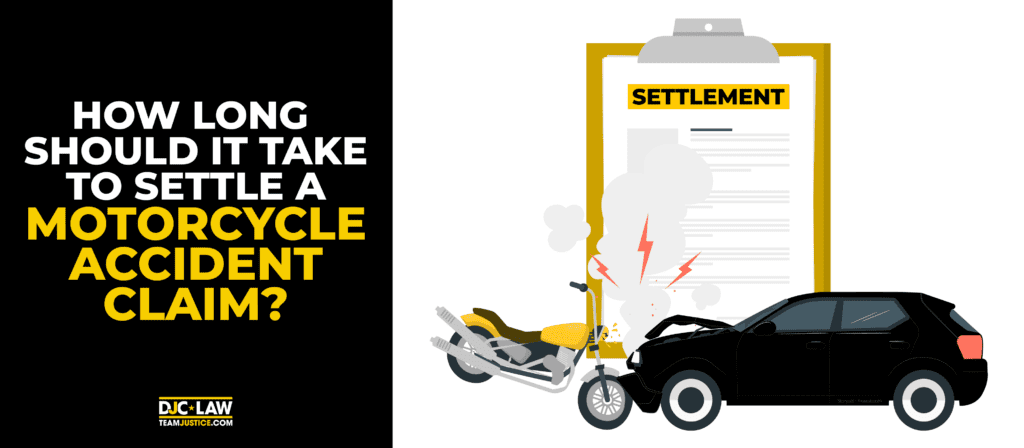
No motorcycle accident attorney can tell you how long your case will take to settle, but they can give you a rough outline based on the facts. In all cases, you’ll get a fair settlement quicker when you hire legal representation.
In this guide, we discuss the ins and outs of motorcycle accident lawsuits, including how long they take, how much they could be worth, and what the process looks like.
Key Takeaways
- The average timeline for settling a motorcycle accident claim depends on its complexity and fault determination. However, most claims are resolved within a year.
- Everyone is eligible to file an accident claim as long as they sustained losses in an accident that wasn’t their fault and they file within the two-year statute of limitations.
- Damages can be received for physical injuries, mental anguish, property damage, lost wages, lost earnings potential, permanent disability, and more.
- Auto accident claims follow a strict process of evidence-gathering, filing a claim, and negotiating with the other insurer. In rare cases, your claim may result in a court trial.
- The value of your claim depends on the extent of your losses and who was at fault. Your lawyer will build the strongest possible case to prove fault and the extent of your injuries.
- Let your attorney take control of your case and keep your documentation organized to stop your claim from being delayed. Texas law forces insurers to respond to claims within 15 days.
What’s the Average Timeline for Settling a Motorcycle Accident Claim?
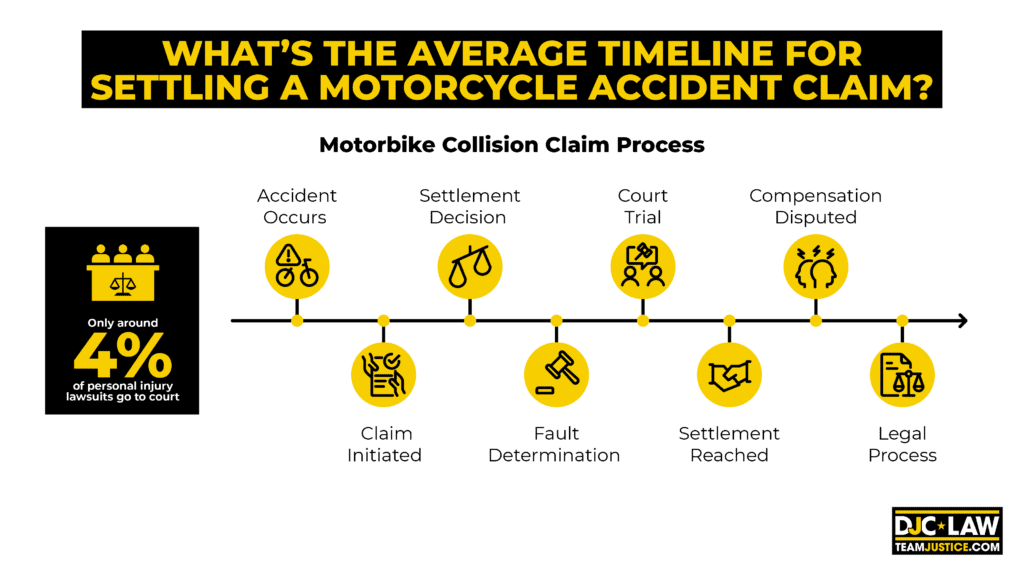
Everyone has a right to pursue a fair settlement for their losses if they were involved in an accident that wasn’t their fault. Typically, most motorbike collision claims are settled within a year of the accident. However, whether your timeline extends beyond this depends on two key elements: whether you settle and fault determination.
Firstly, whether you move to a court trial will be the single biggest factor in determining whether your accident claim takes considerably longer. Few cases go to trial and are settled outside of court, but getting a court date, going through the legal process, and preparing for the formalities can mean spending years in legal red tape.
Thankfully, this rarely happens, with the Bureau of Justice Statistics reporting only around 4% of personal injury lawsuits go to court.
The second element is fault determination. If you were riding along and a drunk driver wiped you out, and there’s clear evidence available to prove this, you may see a fair settlement within a few weeks. However, if the fault is contested or shared, the auto insurance company and its legal team may dispute your side of the story.
Unfortunately, this can also mean compensation is tricky to determine, with each side providing arguments for and against. That’s why some cases end up in court.
What Impacts My Eligibility to File a Motorcycle Accident Claim?
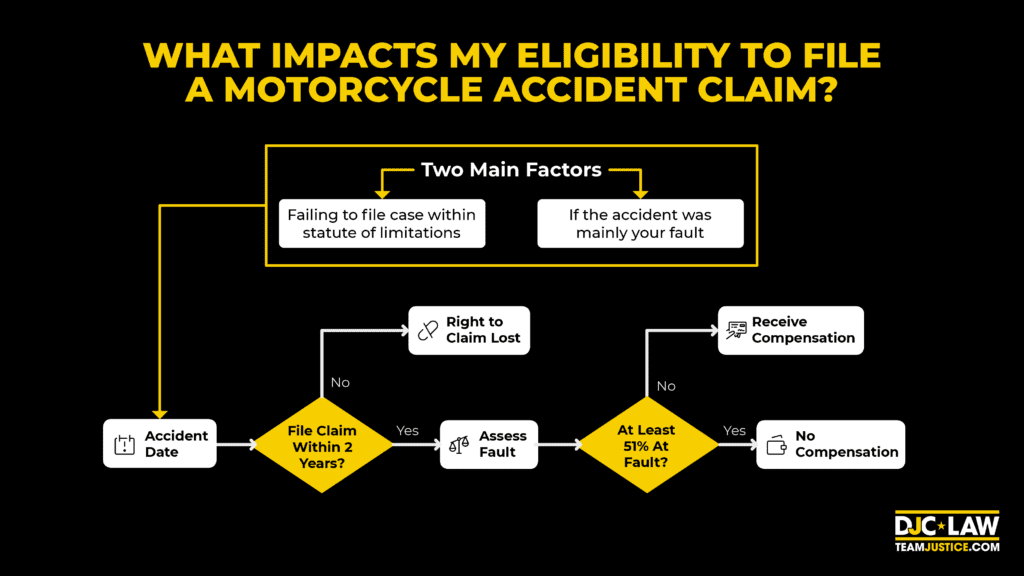
Everyone is eligible to file a motorcycle accident claim. On the other hand, there are two aspects to consider. Failing to file your case within the statute of limitations means you lose the right to claim. Likewise, if the accident was mainly your fault, you’re prohibited from receiving monetary compensation.
Under Tex. Civ. Prac. & Rem. Code §16.003, which discusses the statute of limitations, states that all injured parties have two years from the date of their accident to file a claim. If you don’t, you lose your right to claim. Note that there’s no time limit on when your case has to be resolved, but your lawyer must file your case before the two-year period elapses.
Furthermore, Texas also has a comparative negligence statute in place. According to FindLaw, Texas’s comparative negligence law states that claimants must be no less than 51% at fault for an accident to receive monetary compensation.
For example, if it’s believed both drivers were equally at fault, no monetary compensation will be provided for your motorcycle accident injuries and losses.
What Damages Can I Receive in a Motorcycle Accident Case?
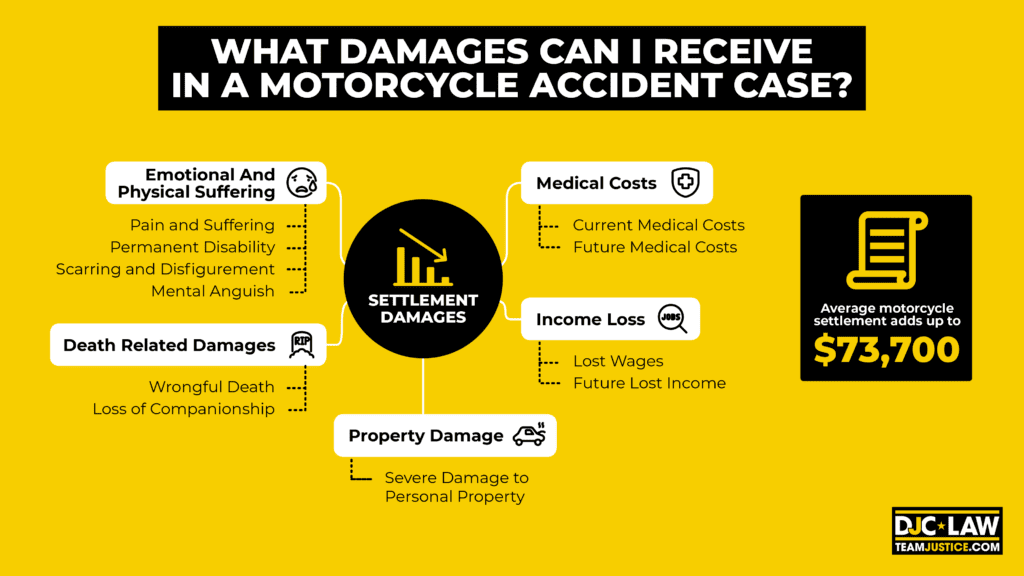
The average motorcycle settlement adds up to $73,700 in a study of cases by All Law. This high amount reflects the severity of motorcycle accidents involving an unprotected rider. However, damages can be derived from other sources beyond physical injuries. Settlements take into account every type of loss.
By filing a claim, you can receive a settlement that reflects all your losses. Some examples of damages you can receive include:
- Current and future medical costs
- Lost wages
- Future lost income
- Property damage
- Pain and suffering
- Permanent disability
- Scarring and disfigurement
- Wrongful death
- Mental anguish
- Loss of companionship
Serious motorcycle accident cases resulting in permanent disability are more complex and can result in substantially higher settlements because your losses are higher. However, it’s up to your motorcycle personal injury attorney to create a strong claim because insurers will always try to minimize your losses.
What Does the Process Look Like After Filing a Motorcycle Accident Claim?
Every motorcycle collision is unique, but the personal injury claims process stays the same. You’ll gather evidence, call a lawyer, and officially file your case. The insurer will then respond, and negotiations will begin to determine your settlement. In some cases, the process may also include going to a court trial.
Let’s go into each of these steps individually for more information on what this might look like.
Gather Evidence to Support Your Claim
All personal injury claims are evaluated based on the evidence. Evidence-gathering can begin from the accident scene if you’re able to do so. Taking photos and videos and talking to eyewitnesses lets you start building your case.
Our Expert Austin motorcycle accident lawyers will also gather evidence to provide both evidence of fault and evidence of your losses. Here are some pieces of evidence that might feature in your case:
- Medical reports
- Rehabilitation records
- Lost wages
- Official police reports
- Expert witness testimony
- Dashcam footage
- Traffic camera footage
- GPS data
- Eyewitness reports
- Vehicular damage
Naturally, evidence is more effective when it’s at its freshest. That’s why the evidence you take from the accident scene is so valuable for setting the scene.
File Your Insurance Claim
With evidence in hand, your lawyer can file your motorcycle personal injury claim. As part of any case, your lawyer will need to prove that the other party was at fault, that they were negligent, and that their actions/inactions resulted in you suffering damages.
It’s all in the evidence. To avoid wasting your time, your attorney will go over the evidence and advise you on whether you have a claim before filing.
The Insurance Company Responds
Your personal injury claim is filed against the insurance company. Under Texas’s at-fault insurance laws, this means the claim is against the other driver’s auto insurer.
The insurance adjuster will review your case and decide its next move, such as whether to pay the requested settlement or negotiate. Beware that at this stage, you’ll see insurers using strategies like:
- Lowballing you.
- Questioning your injuries.
- Intimidating you.
- Blaming you for the accident.
- Deploying delaying tactics.
In all cases, these strategies are designed to get you to accept a lower offer than you deserve. It’s just one of the benefits of hiring an attorney to fight your corner.
Negotiation and settlement
The auto insurance company will negotiate with your lawyer for a fair settlement. Your experienced motorcycle accident attorney will do everything possible to maximize your compensation claim.
Typically, it can take up to 30 days for the insurer to produce an initial settlement offer. They might take even longer to provide subsequent offers, which is why cases can take so long to resolve. The more complex the case, the longer it’s likelier to take.
Once you’ve got an offer you’re happy with, your lawyer will advise you on whether to accept.
How is the Value of My Personal Injury Settlement Determined?
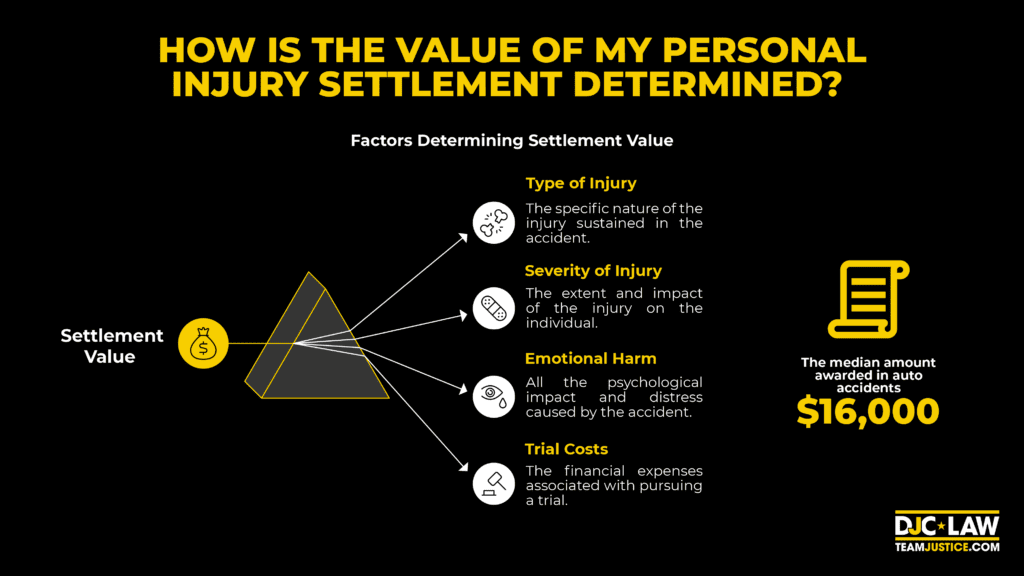
According to a Forbes report, the median amount awarded in auto accidents is $16,000, but motorcycle settlements are substantially higher due to the increased risk of sustaining a serious injury. Settlement amounts focus on the type and severity of your losses, alongside the cost of going to trial.
The value of your settlement really depends on your accident. Someone who has lost the use of their legs permanently will receive more than someone who has a case of road rash. So, what are the main factors used to determine settlement value?
- Type of injury
- Severity of injury
- Emotional harm suffered
- Cost of going to trial
Remember that under Texas’s comparative negligence laws, if you’re partially responsible for an accident, your final settlement will be reduced according to the percentage of liability assigned to you.
For example, if you’re considered 20% responsible, your final settlement will be reduced by 20%.
Why File a Motorcycle Accident Claim?
Filing a motorcycle crash claim ensures that you are in a position to claim back your losses. Not filing a claim, such as by allowing the statute of limitations to expire, means your losses are entirely on you, regardless of the severity.
Another reason to file a formal personal injury claim is to avoid relying entirely on the insurer’s settlement offer. Insurers always approach injured parties with settlements, but these settlements seldom reflect the true value of your losses. Ultimately, insurers aren’t your friends. They’re there to reduce how much they pay you as much as possible.
Filing a lawsuit with a lawyer puts your case in the hands of a legal professional capable of examining all angles and dealing with the underhand tactics used by motorcycle insurance firms.
How Much are Most Motorcycle Accident Settlements?
It’s a common question, and no “standard” motorcycle accident settlement amount exists. Each accident is unique, and averages don’t provide an accurate picture of what you could be entitled to.
According to ConsumerShield, an analysis of five law firms found payouts ranging from $66,000 to $100,000. However, settlements can run much higher or lower than this range. Remember, Forbes reports that motorcyclists are 28 times likelier to die on the roads than other motorists, so it’s no surprise to see average settlements for bikers being much higher.
The only way to find out how much your personal injury claim could be worth is to contact your lawyer and ask them for an estimate. Using their expertise, they’ll be able to give you an idea of what you could be entitled to.
Tips to Expedite Your Motorcycle Accident Claim
Gathering evidence and negotiations take a long time. Claimants can take targeted actions to speed up the claims process and prevent insurer delaying tactics, including using a lawyer and ensuring their documentation is in order.
Follow these tips to ensure your claim doesn’t get needlessly delayed:
- Document Everything – Organize everything relating to your motorbike accident. Keep a folder that includes everything, such as medical bills, repair bills, and photos of your injuries/the accident scene. This ensures no vital evidence is lost.
- Don’t Make a Statement – Never make a statement to the other insurance company or sign anything. When you start speculating on the crash, your case can become infinitely more complex. Speak to your attorney and let them speak on your behalf.
- Don’t Admit Fault – Keep everything factual if you’re forced to speak to an insurer or law enforcement. This includes implying that you might have been to blame or downplaying the severity of your injuries.
- Hire a Austin Motorcycle Accident Lawyer know all the tricks insurers play to slow the claims process down. Enlisting experienced legal representation enables you to counter these tactics and ensure your case chugs along at a reasonable pace.
Sadly, plenty of claimants needlessly delay their cases because they decide to talk to the other insurer. Teams of insurance adjusters are in play with every motorcycle insurance firm in the country, and their sole purpose is to cajole, intimidate, and find fault with your case.
Accepting a Settlement from the Insurance Company vs. Filing a Motorcycle Accident Lawsuit
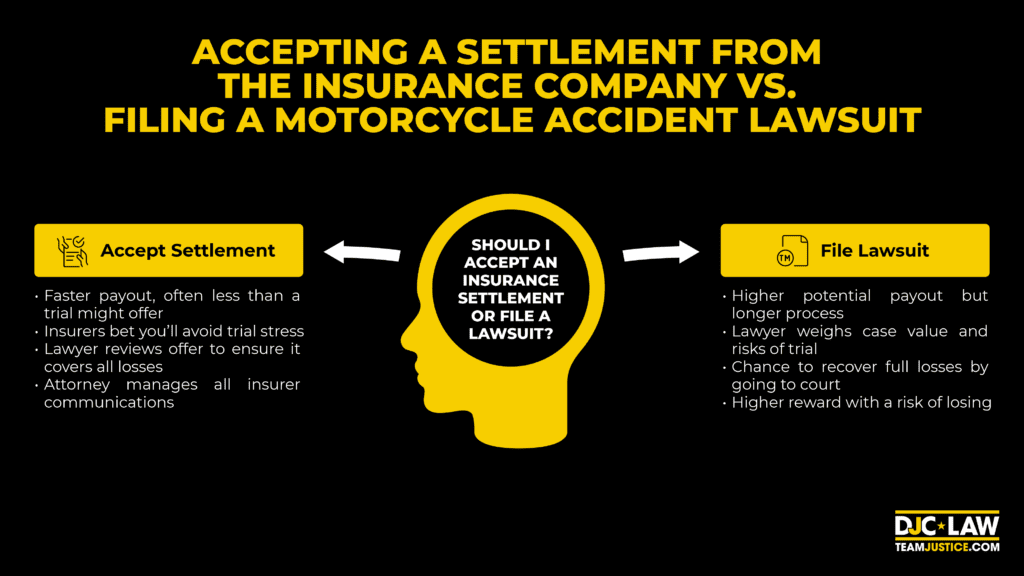
Deciding to accept a settlement or pursue a formal lawsuit is a decision many injured riders have to make. However, those initial settlement offers usually aren’t in your best interest.
Be wary of any initial settlement offers, especially in the first few weeks after your injury. Insurers are relying on the fact that you’re unaware of what a fair settlement is, or you want to avoid the stresses and strains of a trial.
Let your attorney handle all communications with the insurer. In the meantime, they’ll analyze the facts of your case to decide what it could be worth. They’ll decide whether the settlement offer is within a reasonable range and advise you to accept or reject it.
Settlement Value vs. Trial Value
Deciding on the correct course of action is all about the valuation of your case. In motorbike accident claims, there are two types of valuation: settlement and trial value.
The settlement value is how much you could reasonably expect to receive without going to trial. On the other hand, the trial value is the valuation of your case if it went into a courtroom. In all cases, the settlement value will be lower than the trial because settling means you don’t have a chance of losing.
In reality, it works a little like this:
Suppose you have a motorcycle accident claim, and the trial value is $200,000. However, your attorney has determined that you only have a one-in-four chance of winning. These aren’t good odds.
Instead, the insurer is offering a settlement of $40,000, which is 20% of the expected trial value. Although it may seem like a no-brain decision, it’s vital to mention that any decision must be made within the context of your injuries and whether the settlement will cover your losses.
As you can see, deciding whether to go to trial or accept a settlement is trickier than it looks.
How Long Do Insurance Companies Have to Resolve a Claim Involving a Motorcycle in Texas?
Personal injury claims must be filed within two years of an accident occurring, but no deadline exists on when claims must be resolved. However, Texas law imposes several legal deadlines on insurance companies.
Per Texas law, all insurance companies must respond to your claim within 15 days. The 15-day clock begins when your attorney sends them all the required paperwork. The law allows some wiggle room to extend the time limit to 45 days if a valid business reason exists.
The case doesn’t have to be resolved, but the insurer must make a settlement offer within this period. Furthermore, negotiations and settlement offers may continue to go back and forth. Your lawyer will hold your insurer to account regarding these deadlines.
Motorcycle Accident Claims: FAQs
Can I make a personal injury claim if I wasn’t wearing a helmet?
Texas motorcycle law states that all riders aged 21 or over are obligated to wear a helmet. If you were injured while not wearing a helmet, this doesn’t necessarily mean you’re ineligible to make a motorbike accident claim.
Your lawyer can still win damages, but it must be mentioned that by breaking the law, you have a factor that will count against you. The insurer can argue successfully that your injuries wouldn’t have been as severe if you wore a helmet – and this is true.
Despite these factors, you can still file a claim, but you should expect your settlement to be lower.
How can I prove fault in a motor vehicle accident?
Proving fault is the cornerstone of all successful claims. Any and all relevant evidence can be used to prove fault, including photos/videos from the accident scene, traffic camera footage, eyewitness reports, and the official police accident report.
In some cases, your attorney may also draft in expert witness testimony. For example, professional accident reconstructionists can play a big part in proving fault.
What should I do if I’m involved in a hit-and-run motorcycle collision?
Being involved in a hit-and-run motorcycle collision doesn’t prevent your ability to claim. It’s up to law enforcement to investigate the incident and track the fleeing driver down. If the driver remains unidentified, you can’t file a traditional claim because you don’t know who to file the claim against.
All insurers have coverage options for protecting riders hit by hit-and-run drivers. Depending on the policy you’ve got, you may be able to tap into this coverage to claim compensation. Consult your insurance policy and then approach your insurer to ask about your options.

